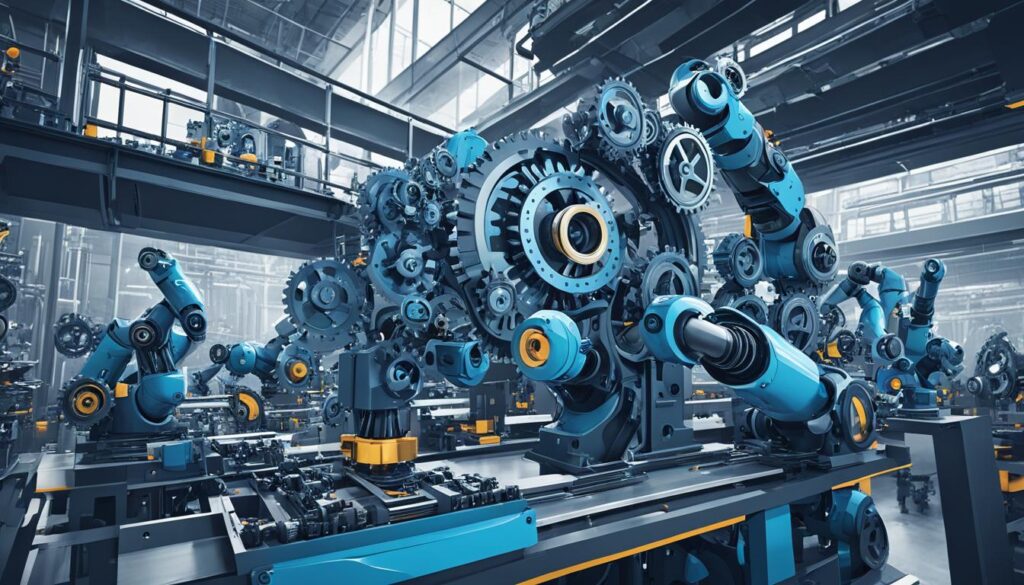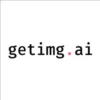At [Company Name], we understand the challenges that businesses face in managing and optimizing their workflows. That’s why we’re excited to introduce you to the power of AI workflow automation. With artificial intelligence (AI) technology, businesses can automate repetitive and time-consuming tasks, allowing employees to focus on more strategic work.
Our automated workflow solutions leverage the capabilities of AI, machine learning, and robotic process automation to streamline your business processes. Whether it’s optimizing customer engagement, improving data management, or enhancing productivity, our intelligent automation platform can revolutionize the way you work.
By implementing AI-powered workflow automation, you can achieve greater efficiency, reduce errors, and save valuable time and resources. Let us help you to unlock the full potential of your business by optimizing your workflows with artificial intelligence.
Our team of experts will guide you through the process of workflow optimization with AI, ensuring a seamless integration into your existing systems. We understand that every business is unique, so our workflow automation solutions are customizable to meet your specific needs and goals.
Don’t let repetitive tasks hold you back. Empower your team and boost productivity with our AI-powered workflow automation solutions. Let us take care of the mundane, so you can focus on what truly matters – growing your business.
Contact us today and discover how our AI workflow automation solutions can transform the way you work.
Understanding the Importance of AI Workflow Automation
AI workflow automation plays a crucial role in the success and growth of businesses. By leveraging the power of artificial intelligence, organizations can streamline their processes, boost productivity, and achieve remarkable results. Let’s explore the key reasons why AI workflow automation is essential for businesses.
- Enhanced Efficiency: AI workflow automation enables businesses to automate repetitive and time-consuming tasks, freeing up valuable time and resources. By automating these tasks, employees can focus on more complex and strategic work, leading to increased productivity and efficiency.
- Reduced Human Error: AI tools are less prone to errors compared to humans. By automating tasks with AI, businesses can minimize human errors and achieve greater accuracy in their operations. This not only improves the quality of work but also saves time and resources.
- Cost-Effectiveness: Hiring additional human labor can be expensive for businesses. AI workflow automation offers a cost-effective solution by reducing the need for additional manpower. By automating tasks, businesses can efficiently manage their resources and allocate them to more critical areas of their operations.
- Scalability: With AI workflow automation, businesses have the flexibility to scale their teams as needed, without the complexities of hiring or firing employees. This scalability allows organizations to adapt to changing business demands and achieve sustainable growth.
AI workflow automation plays a crucial role in maximizing business efficiency and driving productivity and growth. By leveraging AI technology, businesses can optimize their processes, reduce errors, and achieve remarkable results. The benefits of AI workflow automation are endless, making it an essential tool for businesses in today’s competitive landscape.
What can be Automated with AI Workflow Automation?
AI workflow automation offers a wide range of possibilities for automating tasks within a workflow, saving time and increasing efficiency. Let’s explore some examples of tasks that can be automated with AI workflow automation:
- Personalized sales emails: AI tools can generate customized emails based on customer data, allowing sales teams to reach out to prospects in a more personalized and targeted way. This saves time for sales teams and improves sales effectiveness.
- SEO content generation: AI tools can create SEO-friendly content by analyzing keywords and phrases, helping content teams save time while improving search engine rankings. These tools assist in creating relevant and optimized content effortlessly.
- Interactive presentation making: With AI tools, it is possible to generate engaging presentations based on the subject or uploaded document. These tools leverage AI capabilities to automatically create visually appealing and impactful presentations, saving time for presenters and engaging audiences.
These are just a few examples of the tasks that can be automated with AI workflow automation. From sales to content creation and presentation making, AI can significantly streamline workflows and improve productivity by automating repetitive and time-consuming tasks.
Essential Features of AI Workflow Automation Tools
When selecting AI workflow automation tools, there are several essential features to consider. These features play a crucial role in maximizing the benefits of AI automation and ensuring seamless integration into existing workflows. In this section, we will explore the essential features that businesses should look for when choosing AI workflow automation software.
- User-Friendly Interface: The tool should have a user-friendly interface that is intuitive and easy to use. This allows for smooth adoption and minimizes the learning curve for employees.
- Affordability: Affordability is an important factor to consider when choosing AI workflow automation software. Businesses need to ensure that the tool fits within their budget and provides a good return on investment.
- Integration with Existing Systems: Seamless integration with other software and systems is crucial for smooth workflow automation. The AI tool should be able to integrate with existing systems and processes without disruptions.
- Customization and Flexibility: The AI workflow automation software should offer customization options and flexibility to adapt to specific business needs. This allows businesses to tailor the tool to their unique requirements.
By considering these essential features, businesses can choose the right AI workflow automation software that aligns with their goals and optimizes their workflow efficiency.
Steps for Implementing AI Workflow Automation
Implementing AI workflow automation involves a series of steps to ensure its successful integration into your business processes. By following these steps, you can streamline your workflows, increase efficiency, and maximize the benefits of AI technology.
- Assess Your Team’s Goals: Begin by understanding your team’s objectives and identifying the tasks that can be automated to achieve those goals. This will help you prioritize which areas to focus on for workflow automation.
- Map Out Your Workflow: Take the time to map out your existing workflow and identify the tedious and repetitive tasks that can benefit from automation. This step will provide a clear picture of where AI automation can make the most significant impact.
- Research and Select AI Workflow Automation Tools: Conduct thorough research to identify the best AI workflow automation tools that align with your business needs. Look for tools that offer the specific functionalities required to automate your identified tasks.
- Plan and Execute Integration: Once you have chosen the appropriate tools, carefully plan and execute the integration process. Work closely with your IT teams and software providers to ensure a smooth integration that aligns with your existing systems and processes.
- Monitor and Measure Performance: Continuously monitor and measure the performance of your AI integration. This will allow you to identify areas for improvement and ensure that the automation is delivering the desired results.
- Continuous Improvement and Optimization: AI technology is constantly evolving, so it’s crucial to regularly evaluate and optimize your AI workflow automation. Stay up to date with new developments in AI to leverage the latest advancements and maximize workflow efficiency.
By following these steps, your business can successfully implement AI workflow automation and unlock its full potential in streamlining your processes, improving productivity, and driving overall growth.
Why Sendsteps.ai is the Ideal Solution for AI Workflow Automation
At Sendsteps.ai, we understand the importance of AI workflow automation in streamlining business processes and maximizing efficiency. Our AI-powered presentation maker is a game-changer when it comes to creating impactful and engaging presentations effortlessly.
With our user-friendly interface, businesses of all sizes can easily navigate our platform and take advantage of the benefits of AI workflow automation. Whether you’re a small startup or a large corporation, Sendsteps.ai is designed to meet your unique needs and help you streamline your workflows.
One of the standout features of Sendsteps.ai is its ability to generate presentations based on the subject at hand or an uploaded document. This means that presenters can save valuable time by leveraging our AI technology to create customized and impactful presentations in a matter of minutes. No more spending hours crafting slides – with Sendsteps.ai, you can focus on delivering your message and engaging with your audience.
Not only does Sendsteps.ai save time and effort, but it also enhances audience engagement. Our AI presentation maker generates interactive presentations that captivate your audience’s attention and leave a lasting impact. By incorporating interactive elements like quizzes, surveys, and live polls, you can make your presentations more dynamic and foster a deeper connection with your audience.

Sendsteps.ai is committed to providing an affordable and accessible solution for businesses looking to leverage AI workflow automation. Our pricing plans are designed to fit within your budget and deliver exceptional value, allowing you to maximize your return on investment.
Experience the benefits of using Sendsteps.ai for AI workflow automation and take your presentations to the next level. Streamline your workflows, save time, engage your audience, and unlock the full potential of your business with Sendsteps.ai.
Unlocking Efficiency with AI Workflow Automation
AI workflow automation plays a pivotal role in unlocking efficiency by automating repetitive and time-consuming tasks within a workflow. By harnessing the power of AI-powered automation, businesses can streamline their workflows, reduce errors, and save valuable time and resources.
With AI workflow automation, employees can shift their focus from mundane tasks to more strategic and complex work, ultimately improving productivity and efficiency. By automating manual processes, businesses can achieve faster and more accurate task completion.
By leveraging the capabilities of AI-powered automation, businesses can optimize their workflows and achieve higher levels of efficiency. This technology allows for seamless integration of AI algorithms into existing systems, resulting in streamlined processes and reduced human intervention.
AI workflow automation enables businesses to eliminate repetitive and time-consuming tasks, allowing employees to concentrate on value-added activities that require critical thinking and creativity. Additionally, automation can significantly reduce the likelihood of errors, ensuring consistent and reliable outcomes.
Implementing AI workflow automation provides businesses with a competitive edge by empowering them to work smarter, not harder. By harnessing the power of AI, organizations can achieve greater efficiency, deliver high-quality results, and stay ahead in today’s fast-paced business landscape.
Overall, AI workflow automation is a transformative solution that improves efficiency, enhances productivity, and drives business success. By embracing AI-powered automation, businesses can unlock their full potential and achieve new levels of workflow efficiency.
Harnessing the Power of AI Integration and Process Automation
AI integration and process automation revolutionize the way businesses operate. By seamlessly incorporating AI tools and software into existing systems and processes, we can unlock numerous benefits and drive success.
One of the key advantages of AI integration is the ability to automate manual and repetitive tasks that consume valuable human resources. With AI handling these mundane tasks, our team can focus on more valuable and complex work, leading to increased productivity and efficiency.
Furthermore, AI integration improves workflow efficiency by streamlining processes and reducing errors. By automating tasks with AI, we can ensure accuracy and consistency, which ultimately enhances the quality of our outputs.
Cost savings are another significant benefit of AI integration and process automation. By automating tasks that previously required human labor, we can optimize resource allocation and reduce operational costs. This allows us to allocate our budget to other critical areas of our business.
Improved employee satisfaction is yet another advantage of AI integration. When we automate repetitive and mundane tasks, we empower our employees to focus on meaningful and challenging work. This not only boosts morale but also fosters a sense of professional growth and development.
By embracing AI integration and process automation, we gain a competitive advantage in the market. We can deliver products and services more efficiently, respond to customer needs more effectively, and stay ahead of the curve in a rapidly evolving business landscape.
But the benefits of AI integration and process automation are not limited to these areas. With AI as a strategic partner, we can unlock new opportunities, drive innovation, and reshape the way we work.
The Benefits of AI Integration in Workflows:
- Increased productivity and efficiency
- Enhanced workflow efficiency and accuracy
- Cost savings through optimized resource allocation
- Improved employee satisfaction and engagement
- Competitive advantage in the market
- Opportunities for innovation and growth
By harnessing the power of AI integration and process automation, we can transform our workflows, streamline our operations, and drive success in an increasingly digital world.
Discover the endless possibilities of AI integration and process automation with Sendsteps.ai:
| Benefits | Description |
|---|---|
| Increased productivity and efficiency | Automating repetitive tasks frees up time for more valuable work, improving overall productivity. |
| Enhanced workflow efficiency and accuracy | AI integration streamlines processes, reduces errors, and ensures consistent and accurate outputs. |
| Cost savings through optimized resource allocation | Automating manual tasks eliminates the need for additional human labor, reducing operational costs. |
| Improved employee satisfaction and engagement | By automating mundane tasks, employees can focus on more meaningful and challenging work, leading to higher job satisfaction. |
| Competitive advantage in the market | AI integration allows businesses to deliver products and services more efficiently, keeping them ahead of the competition. |
| Opportunities for innovation and growth | AI integration opens up new possibilities and drives innovation within workflows, fostering growth and success. |
Harness the power of AI integration and process automation and propel your business to new heights of efficiency, productivity, and success.
AI Integration and Orchestration: Simplifying Workflows with AI
In today’s fast-paced business environment, organizations are constantly seeking ways to streamline their workflows and enhance efficiency. AI integration and orchestration have emerged as powerful solutions, enabling businesses to automate tasks and simplify their processes. By incorporating different AI tools and software into existing systems, businesses can eliminate manual processes, reduce costs, and enhance overall productivity.
AI integration and orchestration simplifies workflows by seamlessly integrating AI technology into existing systems and processes. This allows businesses to leverage the power of AI to automate time-consuming and repetitive tasks, freeing up human resources for more strategic work. By automating these tasks, businesses can enhance their operational efficiency and ensure consistency in their workflows.
One of the key benefits of AI integration and orchestration is the ability to optimize resources and reduce costs. By automating tasks that were previously performed manually, businesses can allocate their resources more effectively, resulting in cost savings. Furthermore, AI integration enables organizations to scale their operations without the need for extensive hiring, making it a cost-effective solution.
Moreover, AI integration and orchestration enhance accuracy and reliability. AI-powered tools are designed to perform tasks with precision, reducing the risk of human error. This not only increases efficiency but also improves the quality of work and outcomes. Businesses can rely on AI technology to consistently deliver accurate results, ensuring customer satisfaction and operational excellence.
Implementing AI integration and orchestration requires careful planning and consideration. Organizations need to identify the tasks that can benefit from automation and select the appropriate AI tools and software. The integration process should be carried out in collaboration with IT teams and providers to ensure seamless integration with existing systems. Regular monitoring and evaluation of the AI integration are essential to identify areas of improvement and optimize workflows.
| Benefits of AI Integration and Orchestration |
|---|
| 1. Streamlines workflows by automating repetitive tasks |
| 2. Enhances operational efficiency and productivity |
| 3. Optimizes resource allocation and reduces costs |
| 4. Improves accuracy and reliability of tasks |
| 5. Enables scalability without extensive hiring |
Overall, AI integration and orchestration play a crucial role in simplifying workflows and driving business success. By incorporating AI technology into existing systems, organizations can automate tasks, reduce costs, and enhance operational efficiency. Embracing AI integration and orchestration allows businesses to stay ahead of the competition and adapt to the evolving demands of the digital era.
The Benefits of AI and Workflow Automation
When it comes to streamlining operations and enhancing productivity, the integration of AI and workflow automation offers numerous advantages. By automating tasks and freeing up human resources for more complex work, businesses can experience increased efficiency and faster task completion.
One of the key benefits of AI and automation is their ability to reduce errors and improve accuracy. Unlike humans, AI tools are not susceptible to fatigue or distractions, allowing them to consistently deliver high-quality outcomes.
Moreover, AI and workflow automation can lead to significant cost savings. By reducing the need for manual labor and optimizing operational efficiency, businesses can achieve greater cost-effectiveness in their operations.
Additionally, leveraging AI and workflow automation provides businesses with a competitive edge. By automating repetitive and time-consuming tasks, businesses can focus on strategic decision-making and have more time to analyze data and make informed, data-driven decisions.
Overall, the benefits of AI and workflow automation include increased efficiency, improved accuracy, cost savings, and a competitive advantage in the market. By harnessing the power of AI, businesses can unlock their full potential and pave the way for greater success.

| Benefits of AI and Workflow Automation |
|---|
| Increased efficiency |
| Improved accuracy |
| Cost savings through reduced manual labor |
| Competitive advantage through data-driven decision-making |
Implementation Steps for AI Integration and Orchestration
Implementing AI integration and orchestration involves a series of steps that businesses can follow to seamlessly incorporate AI into their existing workflows. By carefully planning and executing these steps, organizations can harness the power of AI to automate tasks and enhance overall efficiency. Here are the essential steps for implementing AI integration and orchestration:
1. Identify processes for automation: Start by identifying the manual or repetitive tasks within your workflows that can benefit from AI automation. This could include data entry, document processing, or customer support, among others.
2. Choose the right AI solution: Once you have identified the processes for automation, research and select the AI integration solution that best suits your business needs. Consider factors such as the functionality, compatibility, and scalability of the solution.
3. Determine data sources: To ensure that the AI algorithms have access to the necessary data, determine the data sources and integration points within your workflows. This may involve integrating with existing systems or collecting data from various sources.
4. Collaborate with IT teams and providers: Work closely with your IT teams and AI solution providers to effectively integrate AI into your workflows. This collaboration will help ensure a smooth transition and address any technical challenges along the way.
5. Monitor and measure AI performance: Regularly monitor and measure the performance of your AI integration and orchestration. This will allow you to identify areas for improvement, make necessary adjustments, and optimize the performance of your AI-powered workflows.
6. Continuous improvement and optimization: AI technology is constantly evolving, so it is essential to continuously improve and optimize your AI integration and orchestration processes. Stay updated with the latest advancements in AI technology to maximize the efficiency and effectiveness of your workflows.
By following these implementation steps, businesses can successfully integrate AI into their workflows and optimize their processes for improved efficiency and productivity.
The Power of AI Tools in Workflow Automation
AI tools have revolutionized workflow automation, offering unprecedented efficiency and productivity gains for businesses. Leveraging advanced technologies like machine learning, natural language processing, and robotic process automation, these tools automate repetitive and time-consuming tasks, freeing up valuable time and resources.
One of the key benefits of using AI tools in workflow automation is the ability to streamline operations. Tasks such as data entry and processing, customer support and interaction, and content generation can be automated, reducing manual effort and improving overall efficiency. By automating these processes, businesses can achieve faster task completion times and allocate their human resources to more strategic initiatives.
AI tools also play a vital role in reducing errors and improving accuracy. Unlike humans, AI-powered tools are less prone to mistakes and can perform tasks with a higher degree of precision. This leads to higher-quality outcomes and enhances overall workflow performance.
The benefits of incorporating AI tools into workflow automation extend beyond efficiency gains. By automating repetitive tasks, businesses can significantly reduce costs associated with manual labor. AI tools offer a cost-effective solution, eliminating the need to hire additional staff for mundane and repetitive tasks.
Additionally, AI tools enable businesses to save valuable time, allowing employees to focus on more strategic and complex work. By automating administrative tasks, teams can devote their energy to activities that require critical thinking and creativity, ultimately driving innovation and growth.
It’s important to note that AI tools are not one-size-fits-all solutions. Different tools offer varying capabilities and functionalities. When choosing AI tools for workflow automation, businesses should consider their specific needs and requirements. Factors such as ease of use, integration capabilities with existing systems, and customization options should all be taken into consideration.
The power of AI tools in workflow automation is undeniable. From streamlining operations to reducing errors and saving costs, their impact on business efficiency and productivity is profound. By leveraging these tools, businesses can optimize their workflows, enhance the quality of their outputs, and gain a competitive edge in today’s fast-paced business landscape.
| Benefits of AI Tools in Workflow Automation |
|---|
| Streamline operations |
| Reduce errors and improve accuracy |
| Cost savings through reduced manual labor |
| Saves time and allows for focus on strategic work |
The Impact of Workflow Automation on Business Processes
Workflow automation plays a crucial role in optimizing business processes, offering a wide range of benefits that can transform the way we work. By harnessing the power of automation, organizations can streamline operations, improve efficiency, and drive productivity.
Improving Efficiency and Productivity
One of the significant impacts of workflow automation is the improvement of efficiency within business processes. By eliminating manual tasks and automating repetitive workflows, organizations can save valuable time and resources. Employees can focus on more strategic and complex work, leading to increased productivity and smoother operations. Additionally, streamlined workflows enable tasks to be completed at a faster pace, ensuring timely delivery of products and services.
Enhancing Accuracy and Consistency
Workflow automation ensures consistency and accuracy by automating repetitive tasks that are prone to human error. By relying on automated processes, businesses can reduce the risk of mistakes, ensuring that tasks are completed correctly every time. This not only improves the quality of outputs but also enhances customer satisfaction and builds trust in the brand. Automated workflows provide consistency in the execution of tasks, ensuring that the same standards are met consistently across different processes.
Reducing Costs and Optimizing Resource Allocation
One of the key benefits of automating business processes is the reduction of costs associated with manual labor. By automating repetitive and time-consuming tasks, organizations can eliminate the need for additional workforce, reducing labor expenses. Automation also improves resource allocation by ensuring that resources are utilized efficiently. By optimizing the allocation of time, money, and manpower, businesses can achieve cost savings while maximizing outcomes.
Overall, the impact of workflow automation on business processes is substantial. It improves efficiency, enhances accuracy, and reduces costs, leading to optimized operations and improved outcomes. By embracing automation, organizations can work more efficiently and effectively, gaining a competitive edge in the market.
| Benefits of Workflow Automation |
|---|
| Improved efficiency and productivity |
| Enhanced accuracy and consistency |
| Reduced costs and optimized resource allocation |
Overcoming Challenges in AI Workflow Automation
While AI workflow automation offers numerous benefits, businesses must also confront various challenges along the way. Addressing these challenges is crucial to successfully implementing AI workflow automation and maximizing its advantages. Let’s explore some of the key challenges and strategies to overcome them:
-
Initial Implementation Process: The initial implementation of AI workflow automation requires careful planning, integration, and training. To overcome this challenge, businesses should:
- Thoroughly assess their workflow and identify areas that can benefit from automation.
- Research and select the appropriate AI workflow automation tools that align with their specific needs.
- Plan and execute a seamless integration process, working closely with IT teams and providers.
-
Potential Resistance from Employees: Employees may feel threatened by automation, fearing that their jobs will be replaced. To address this challenge, businesses should:
- Implement effective change management strategies to communicate the benefits of AI workflow automation.
- Offer training programs to help employees adapt to new roles and responsibilities.
- Emphasize the value of AI as a tool to enhance productivity and enable employees to focus on more strategic work.
-
Data Privacy and Security: Implementing AI workflow automation involves handling sensitive data. To ensure data privacy and security, businesses should:
- Comply with relevant data protection regulations and standards.
- Implement robust security measures to protect data from unauthorized access or breaches.
- Regularly monitor and audit data processes to identify and address any vulnerabilities.
-
Rapid Advancement of AI Technology: The rapid evolution of AI technology requires businesses to stay updated and adapt to new developments. To stay ahead, businesses should:
- Stay informed about the latest advancements in AI workflow automation.
- Continuously evaluate and update their automation strategies to leverage new technologies.
- Invest in ongoing learning and development to keep employees informed and skilled in utilizing AI tools.
| Challenges | Strategies to Overcome |
|---|---|
| Initial Implementation Process |
|
| Potential Resistance from Employees |
|
| Data Privacy and Security |
|
| Rapid Advancement of AI Technology |
|
By effectively addressing these challenges, businesses can successfully implement AI workflow automation and unleash its full potential to streamline processes, enhance productivity, and drive growth.
Future of AI Workflow Automation
The future of AI workflow automation is shaped by ongoing advancements and evolving trends. As AI technology continues to improve, businesses can expect a multitude of benefits, including more sophisticated automation capabilities and enhanced performance. The integration of AI with other emerging technologies, such as the Internet of Things (IoT) and big data analytics, will further optimize business processes and unlock new possibilities. Let’s explore the future trends and opportunities in AI workflow automation.
Evolving Trends in Workflow Automation
One of the prominent trends in workflow automation is the growing use of AI-powered chatbots and virtual assistants. These intelligent automation tools streamline customer interactions, improve response times, and provide personalized support. With natural language processing capabilities, these chatbots can understand and respond to user queries, improving customer satisfaction and reducing the workload on human agents.
Another key trend is the integration of AI with robotic process automation (RPA). This combination enables businesses to automate complex end-to-end processes, involving both human-driven and software-driven tasks. By leveraging AI’s cognitive capabilities and RPA’s rule-based automation, organizations can achieve higher levels of efficiency and accuracy.
The future of AI workflow automation also includes the integration of AI with advanced analytics and machine learning algorithms. This integration enables businesses to gain deeper insights from their data, identify patterns, and make informed decisions. By leveraging AI-driven analytics, organizations can optimize their workflows, identify potential bottlenecks, and proactively address issues.
Increased Adoption Across Industries
The adoption of AI workflow automation is expected to increase across industries as businesses recognize the benefits it offers. From healthcare and finance to manufacturing and retail, organizations are embracing automation to streamline their operations, improve productivity, and deliver better customer experiences.
In the healthcare industry, AI workflow automation can enhance patient care by automating administrative tasks, such as appointment scheduling and billing. This allows healthcare professionals to focus more on patient care and spend less time on paperwork. Additionally, AI-powered diagnostic tools can help in early detection of diseases and assist in providing accurate treatment recommendations.
In the manufacturing sector, AI workflow automation can optimize production processes, minimize downtime, and improve overall efficiency. AI-powered robots and automated systems can handle repetitive and hazardous tasks, ensuring worker safety and increasing productivity. With real-time data analysis, manufacturers can also identify areas for process improvement and make data-driven decisions.
Furthermore, the retail industry can benefit from AI workflow automation by automating inventory management, personalized marketing campaigns, and customer support. By leveraging AI tools, retailers can have better inventory visibility, reduce stockouts, and enhance the overall shopping experience for customers.
The Future is Bright
The future of AI workflow automation holds immense potential for businesses across various sectors. Advancements in AI technology, coupled with the integration of complementary technologies, will revolutionize the way organizations operate, leading to increased efficiency, productivity, and competitive advantage.
By staying informed about the evolving trends in workflow automation and embracing AI-powered solutions, businesses can position themselves at the forefront of innovation. The future of AI workflow automation is undoubtedly bright, with endless possibilities awaiting organizations that leverage its capabilities. Are you ready to unlock the full potential of AI workflow automation?
| Benefits of Future AI Workflow Automation | Industries |
|---|---|
| 1. Enhanced Efficiency | Healthcare |
| 2. Improved Accuracy | Manufacturing |
| 3. Cost Savings | Retail |
| 4. Streamlined Operations | |
| 5. Advanced Analytics |
Conclusion
AI workflow automation is a game-changer for businesses, offering a wide range of benefits that can revolutionize operations. By incorporating AI technology, organizations can streamline their processes, save time, and boost productivity. Automating repetitive and time-consuming tasks with AI allows employees to focus on more strategic work, driving efficiency and innovation.
The advantages of AI workflow automation are numerous. It enhances efficiency by eliminating manual processes and reducing human error. With AI-powered automation, businesses can complete tasks faster and more accurately, leading to improved outcomes. Additionally, automation reduces costs by minimizing the need for manual labor and optimizing resource allocation.
When choosing AI workflow automation software, it is crucial to consider factors such as user-friendliness, affordability, and integration capabilities. Sendsteps.ai stands out as an ideal solution for interactive presentation making. With its intuitive interface and affordable pricing, Sendsteps.ai empowers businesses of all sizes to create engaging presentations effortlessly.
Embrace the future of AI workflow automation and unlock the full potential of your business with Sendsteps.ai. Experience streamlined workflows, improved efficiency, and increased productivity. Discover how AI-powered automation can give your business a competitive edge by trying Sendsteps.ai today.
FAQ
Q: What is AI workflow automation?
A: AI workflow automation is the use of artificial intelligence (AI) to automate repetitive and time-consuming tasks within a workflow.
Q: Why is AI workflow automation important for businesses?
A: AI workflow automation enhances efficiency by automating repetitive tasks, reduces human error, is cost-effective, and allows for scalable teams.
Q: What tasks can be automated with AI workflow automation?
A: AI workflow automation can automate tasks such as personalized sales emails, SEO content generation, and interactive presentation making.
Q: What are the essential features of AI workflow automation tools?
A: Essential features of AI workflow automation tools include user-friendliness, affordability, integration capabilities, and customization options.
Q: What are the steps for implementing AI workflow automation?
A: The steps for implementing AI workflow automation involve assessing goals, mapping out the workflow, selecting tools, integrating them, and continuous improvement.
Q: Why is Sendsteps.ai an ideal solution for AI workflow automation?
A: Sendsteps.ai offers an AI presentation maker that generates interactive presentations based on subject or uploaded documents, streamlining workflows effectively.
Q: How does AI workflow automation unlock efficiency?
A: AI workflow automation automates repetitive tasks, allowing employees to focus on more strategic work, ultimately improving productivity and efficiency.
Q: What is the concept of AI integration and process automation?
A: AI integration and process automation involve incorporating AI tools into existing systems to automate tasks, enhancing efficiency and reducing costs.
Q: How does AI integration and orchestration simplify workflows?
A: AI integration and orchestration automate manual processes, enhancing efficiency, optimizing operations, and improving overall productivity.
Q: What are the benefits of AI and workflow automation?
A: AI and workflow automation increase efficiency, improve accuracy, reduce costs, and provide a competitive advantage in the market.
Q: What are the steps for implementing AI integration and orchestration?
A: The steps for implementing AI integration and orchestration involve identifying processes, choosing the right solution, integrating and monitoring performance.
Q: How do AI tools contribute to workflow automation?
A: AI tools automate tasks, improve efficiency, and save time and resources by leveraging AI technologies such as machine learning and natural language processing.
Q: What is the impact of workflow automation on business processes?
A: Workflow automation improves efficiency, accuracy, and reduces costs by eliminating manual processes, leading to better outcomes and smoother operations.
Q: What are the challenges in AI workflow automation?
A: Challenges in AI workflow automation include implementation, employee resistance, data privacy, security, and staying updated with AI technology.
Q: What is the future of AI workflow automation?
A: The future of AI workflow automation includes advancements in automation capabilities, integration with other technologies, and increased adoption across industries.









